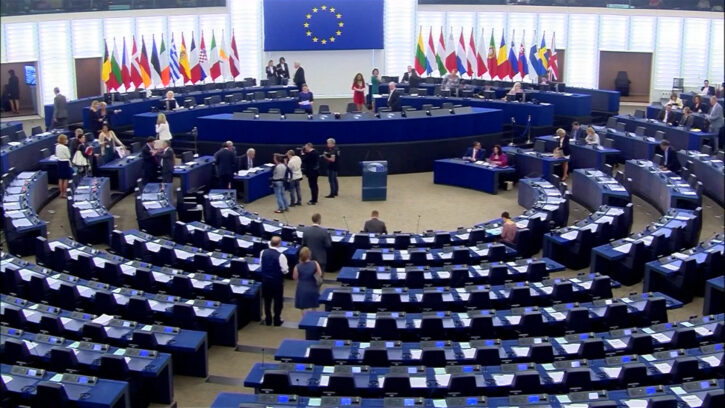
EU citizens want illegal migrants arriving at EU borders to be treated more humanely, and on Saturday they called in the European Parliament on politicians to really help people in migrants' countries of origin to reduce their influx.
The European Parliament on Saturday started a plenary at which 80 EU citizens were presenting conclusions of discussions on different topics held by 800 randomly chosen citizens in September and October.
“Citizens are worried about illegal migrations so our working group discussed that topic more than labour migration between the member states,” Croatian pensioner Dajana Milinković said in a public address.
Migrations should be destigmatised, human rights respected
Milinković was speaking on behalf of 200 European citizens who discussed the topic of migrations and the EU in the world. Participating in the discussions was another Croatian pensioner, Dragan Volarević from Zadar, who was also presenting conclusions of that citizens’ working group on Saturday.
“One should tackle the real causes of migrations and find ways and funds to help people stay in their countries of origin, by helping them financially and otherwise,” Milinković added.
She advocated legal migrations.
“There will be less illegal migration if we establish good programmes of legal migration. That is what the EU lacks with regard to ‘third world’ countries,” she said.
Citizens across the EU feel that they have no influence on decision-making processes, which is why euro-skepticism has been on the rise so the three main EU institutions – the European Commission, the Council of the EU and the European Parliament – have launched a series of discussions called the Conference on the Future of Europe.
“Citizens have asked to be more involved instead of just being called to go to the polls every five years, so this is our answer to their wish,” European Commissioner for Democracy and Demography Dubravka Šuica said on Saturday.
Randomly chosen citizens who were invited in October to discuss migrations and the EU in the world have told politicians that they do not want violence against migrants such as that recorded on the Croatian border.
“Migrants’ human rights need to be respected. They are humans too and we need to respect them,” said Milinković, who comes from the northern Adriatic town of Umag.
Her speech in the European Parliament was welcomed by a round of loud applause.
Earlier this month, media broadcast footage of masked Croatian police officers clubbing migrants who had tried to enter Croatia from Bosnia and Herzegovina through a forest.
Wishing to lead the country into the Schengen area of passport-free movement, the Croatian government has been trying to convince the European Commission that it is capable of protecting the joint border. Similar reports of brutality by Croatian police have been arriving for months.
The Greek and Romanian governments have also been criticised in recent months over police conduct towards migrants.
“Migrations need to be destigmatised. They should be accepted as a fact,” Milinković said.
“European countries need voluntary, legal migrants. That is why they need to be provided with better education in the countries they come from,” she said.
Croatia not participating in refugee scholarship programme
Officials from the foreign ministries of 42 countries-members of the Union for the Mediterranean met in Barcelona this past Thursday to discuss the inclusion of refugees in the recipient-countries’ education systems.
The talks focused on a project as part of which 300 refugees, mostly from Syria, will be granted university scholarships.
The three-year project so far has been joined by 10 of the 42 countries of the Union for the Mediterranean but Croatia is not among them.
A spokesperson for the Union has said that the aim is for as many countries as possible to join in and to extend the project.
A Croatian government official, however, told Hina: “That’s it as far as the project is concerned. Those who wanted to participate have joined in.”
Involved in the project are currently Poland, Italy, Spain, France, Portugal, Turkey, Egypt, Lebanon, Jordan and Morocco. The initiative for the project was launched by Portugal where refugees staying there have already enrolled at universities.
The funds for the education of refugees would be raised through donations by foundations, solidary taxation of the academic community, and risk capital fund investments in talented students.





Kakvo je tvoje mišljenje o ovome?
Budi prvi koji će ostaviti komentar!